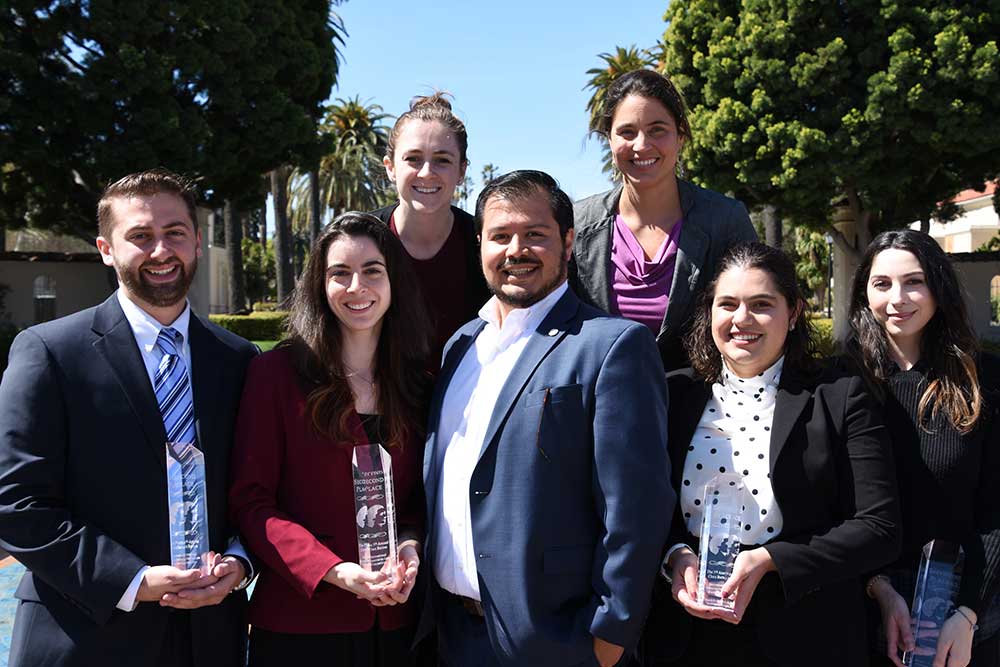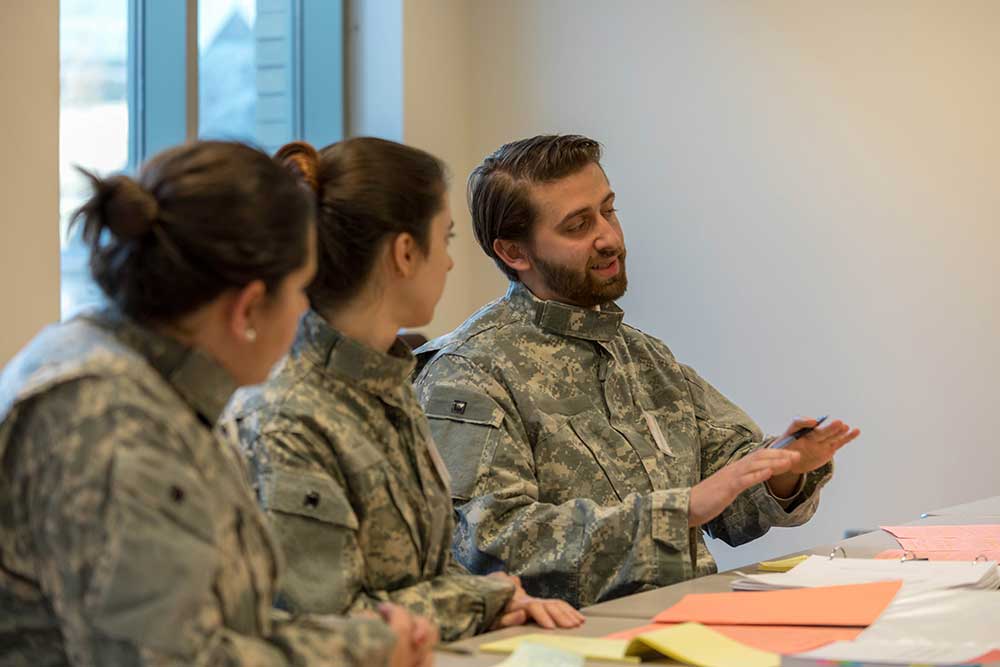In March 2018, Santa Clara University School of Law reached the finals of the prestigious Clara Barton International Humanitarian Law Competition held in Washington D.C, and hosted by Georgetown University Law Center. The Santa Clara team consisted of Amanda Saber ’18, Jessica Szychowski ’19, Joey Eisenberg ’19, and Michelle Deveraux ’18, and was coached by Prof. Claudia Josi along with team members and semi-finalists of last year’s Clara Barton Competition, Tessa Stephenson ’18 and Miguel Flores J.D. ’17.
The team’s success is made even more laudable given the strength of this pool of competitors including teams from law schools such as UCLA, American University, Georgetown, Loyola, as well as three of Service Academies including the United States Military Academy (West Point), the United States Naval Academy (Annapolis) and the eventual first place team, the United States Air Force Academy.
The team’s exceptional performance in this moot court competition also upholds Santa Clara’s long-standing tradition and excellence in international humanitarian law and public international law, building upon last year’s success where Santa Clara’s team reached the semi-finals and the success of the 2013 team that reached the finals in the English-speaking session of the International Jean Pictet Competition, another prestigious international humanitarian law competition. Also, in 2014 one member of the team won an award for best oralist in the same competition.
The Clara Barton Competition is a simulation-based competition organized by the Clara Barton Competition Committee and the Canadian and American Red Cross. Named for the founder of the American Red Cross, Clara Barton, this experiential legal competition exposes rising professionals to the practice of IHL and to real world challenges practitioners face during armed conflict. Participants engage in practical role-playing exercises, during which they are asked to assume various professional roles and accomplish a wide range of tasks reflective of those performed by practitioners in the field. Unlike traditional moot court competitions, participants explore the application of the law through simulated, but realistic case studies of armed conflict which continue to evolve throughout the competition. This unique facet of the competition offers participants a dynamic and creative atmosphere in which to explore complex legal issues.
The Competition tests participants’ knowledge of international humanitarian law and public international law, as well as their ability to present, advocate for, and defend legal positions to a diverse range of stakeholders in different simulated environments. It provides the participants with a unique opportunity to address some of the most contentious and timely issues in contemporary international humanitarian law, from the legality of weapons systems, to the legal standards of the treatment of detainees, to the proportionality assessment in the use of force.
Even more rewarding, and arguably challenging, is that the judges and organizers of the competition include members of the International Committee of the Red Cross, the American Red Cross, current and former members of the Judge Advocate Corps, and highly recognized scholars, like Gary D. Solis (author of one of the most well-known books on the law of armed conflict). In one particular instance the level of experience and knowledge gathered at the competition came into relief, “In the final round, I had The Law of Armed Conflict [written by Solis] on the table and quoted Solis to Solis, who was one of the judges that round. I think our team got a wink” recounted Joey Eisenberg.
Amanda Saber adds, “This area of the law has not been my focus in law school, nonetheless, the ability to negotiate effectively, think on my feet and collaborate with my team in high-stress situations are all skills that will serve me well in any practice. I cannot understate the importance of taking advantage of every opportunity like this to develop skills and expand your horizons.” (Read more about Amanda’s impressions in The Advocate here.)
Another aspect of the competition that makes it such a valuable experience for students is the grounded aspect of the simulations. In Round 3 this year’s competition, the simulation was interrupted at several times by “military personnel” updating the teams in the room on the evolving scenario on the ground. Do you authorize a military strike on a house where a high value target is hiding, but that is located in a populated area? The analysis evolves when you find out that ground forces are now surrounded. As one of the competitors put it “we didn’t have time to second guess our decision making, and instead had to rely on our instincts and our months of practice to give a ‘yes’ or ‘no’ response” adding, “we felt like real lawyers”
“The team and I are very thankful for the support of Co-Coaches, Tessa Stephenson and Miguel Flores, for their invaluable assistance in preparing them for this experience, as well as for Prof. Francisco Rivera’s help with some of the practice simulations”. Professor Josi says the team’s exposure to the law school’s faculty, widely recognized for its expertise in the international law, was a contributing factor to the team’s success. “Their support enabled team members to become well versed in not only the academic aspects of international humanitarian law, but also some of the related areas of the law, such as international refugee law, and international human rights law,” she said. Mr. Flores added “the team’s result is so richly deserved given the time every member of the team put in since last year, meeting at least twice a week beginning with the application process and putting in countless hours of research and practice individually.” The level this year increased over last year, but the program hopes to continue their success next year, building on the experience of this year’s team.

Left to right, bottom row: Joey Eisenberg ’19, Jessica Szychowski ’19, Miguel Flores J.D. ’17, Amanda Saber ’18, Michelle Deveraux ’18. Left to right, top row: Tessa Stephenson ’18 and Professor Claudia Josi.

